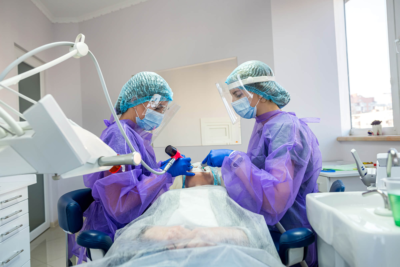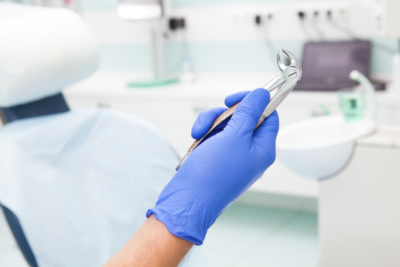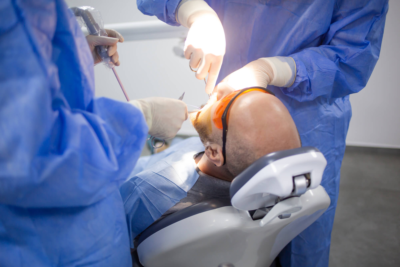Wisdom teeth, those troublesome teeth at the back of your mouth, can be quite unpredictable. Sometimes they cause no issues and go unnoticed. But there are times when they don’t come in properly and become a source of discomfort. In such cases, getting them removed is necessary. If you’re scheduled for wisdom teeth removal in Greenville, NC, it’s important to know what to expect before, during, and after the procedure. In this article, we’ll walk you through the entire process, providing valuable information for a successful wisdom teeth extraction.
 WHEN IS IT NECESSARY TO REMOVE WISDOM TEETH?
WHEN IS IT NECESSARY TO REMOVE WISDOM TEETH?
Not everyone needs to get their wisdom teeth removed. Some people have enough space in their mouths for these extra molars without any problems. However, there are situations where extracting wisdom teeth becomes necessary. Here are some common reasons:
- Impaction: Wisdom teeth may get stuck and unable to fully come out due to lack of space. This can cause pain, swelling, and infections.
- Overcrowding: Sometimes, wisdom teeth can push against other teeth, leading to overcrowding or misalignment.
- Decay and Gum Disease: Wisdom teeth are hard to clean, making them prone to tooth decay and gum disease. If these problems persist despite efforts to maintain oral hygiene, removing them may be necessary.
- Cysts or Tumors: Although rare, wisdom teeth can develop cysts or tumors that can damage surrounding teeth and jawbone.
- Orthodontic Treatment: In some cases, wisdom teeth can interfere with ongoing or planned orthodontic treatment. To ensure successful alignment, dentists may suggest removing the wisdom teeth.
BEFORE WISDOM TEETH EXTRACTION
Scheduling an Appointment with the Oral Surgeon
The first step in the process is to schedule an appointment with an oral surgeon. You can either be referred to a specialist by your dentist or proactively seek out a reputable oral surgeon in your area. It’s important to choose a qualified and experienced oral surgeon who specializes in wisdom teeth removal in Greenville, NC.
During this appointment, you will have the opportunity to discuss your concerns and ask any questions you may have. The oral surgeon will assess your specific situation and determine whether wisdom teeth extraction is necessary.
Understanding the Need for Extraction Through Examination and X-rays
To evaluate your wisdom teeth and assess the need for extraction, the oral surgeon will conduct a thorough examination of your mouth. This examination may involve taking X-rays or other imaging scans to get a clear picture of the position, size, and alignment of your wisdom teeth.
The examination and X-rays are crucial in determining whether your wisdom teeth are causing any problems or have the potential to cause issues in the future. The oral surgeon will explain the findings to you and discuss the reasons for recommending extraction. They may point out issues such as impaction, overcrowding, decay, or the risk of developing cysts or tumors.
Discussing Anesthesia Options and Preparing for the Procedure
During your consultation with the oral surgeon, you will also discuss the anesthesia options available for wisdom teeth extraction. The choice of anesthesia depends on various factors, including the complexity of the procedure, your comfort level, and any medical considerations.
The oral surgeon will explain the different types of anesthesia, such as local anesthesia, sedation, or general anesthesia. They will discuss the benefits and risks associated with each option and help you determine the most suitable choice for your specific needs.
Preparing for the Procedure
In addition to anesthesia, the oral surgeon will provide you with detailed instructions on how to prepare for the wisdom teeth extraction procedure. This may include:
- Fasting: You may be instructed to refrain from eating or drinking for a certain period of time before the surgery. This is typically done to ensure your stomach is empty and reduce the risk of complications during the procedure.
- Medication: The oral surgeon will provide specific guidelines regarding medications to avoid prior to the surgery. Certain medications, such as blood thinners, may need to be temporarily discontinued to reduce the risk of excessive bleeding during the procedure.
- Transportation: Since the procedure involves the use of anesthesia, it is often recommended to arrange for a responsible adult to accompany you to the appointment and drive you back home afterward. This is to ensure your safety and well-being, as the effects of anesthesia can impair your ability to drive.
- Comfort Measures: The oral surgeon may suggest using over-the-counter pain relievers or applying ice packs to reduce any discomfort or swelling before the procedure. They may also advise you to wear comfortable clothing and avoid wearing any jewelry or contact lenses on the day of the surgery.
 DURING WISDOM TEETH EXTRACTION
DURING WISDOM TEETH EXTRACTION
Different Types of Extractions
When it comes to wisdom teeth removal in Greenville, NC, there are two main types of extractions that may be performed:
Simple Extractions
These are typically performed when the wisdom teeth have fully erupted and are visible in the mouth. The oral surgeon will numb the area around the tooth with a local anesthetic, then, he or she will gently loosen the tooth and remove it.
Surgical Extractions
Surgical extractions are necessary when the wisdom teeth are impacted or have not fully emerged from the gum line. In this case, the oral surgeon may need to make an incision in the gum tissue to access the tooth. Surgical extractions are more complex and may require a combination of local anesthesia, sedation, or general anesthesia to ensure your comfort during the procedure.
Step-by-Step Overview of the Procedure
Having a clear understanding of the step-by-step process of wisdom teeth extraction can help alleviate any anxiety or uncertainty you may have. Here’s a breakdown of what typically happens during the procedure, from start to finish:
- Anesthesia: Before the extraction begins, the dental team will administer the chosen anesthesia to ensure you are comfortable and pain-free throughout the procedure.
- Incision (if necessary): If you require a surgical extraction, the oral surgeon will make a small incision in the gum tissue to access the wisdom tooth.
- Tooth Removal: Using specialized instruments, the oral surgeon will carefully loosen and remove the wisdom tooth. In some cases, the tooth may need to be divided into smaller pieces for easier removal.
- Cleaning and Stitches: Once the tooth is removed, the oral surgeon will clean the extraction site to remove any debris. If necessary, stitches may be placed to promote proper healing.
- Gauze and Recovery: Gauze will be placed over the extraction site to control bleeding, and you will be given instructions on how to properly care for the area during the initial recovery period.
AFTER WISDOM TEETH EXTRACTION
Immediate Recovery
After the wisdom teeth extraction procedure, the immediate recovery phase is crucial for your comfort and healing. Here’s what you can expect during this stage:
- Post-surgery Monitoring: The dental team will monitor you as you wake up from anesthesia to ensure a smooth transition. They will check your vital signs and provide necessary post-operative care.
- Managing Discomfort: It is common to experience some bleeding, swelling, and discomfort after wisdom teeth removal in Greenville, NC. The dental team will provide guidance on managing these symptoms, including tips on how to control bleeding and reduce swelling.
- Instructions: You will be given instructions on how to change the gauze pads placed over the extraction sites and when to apply ice packs to the outside of your face to help reduce swelling.
- Timeline for Complete Recovery: The initial recovery phase typically lasts a few days to a week, during which you may experience gradual improvement. Complete healing can take several weeks to months, depending on the complexity of the extraction and your body’s healing ability.
Home Care and Healing
Once you are home, proper care and healing are essential for a smooth recovery. Here are some important aspects of home care:
- Pain Management Strategies: The dental team will prescribe or recommend pain medications to help manage any discomfort during the healing process. They will provide instructions on when and how to take them.
- Dietary Restrictions: You will be advised to follow a soft food diet for a few days to allow for proper healing. Avoiding hard, chewy, or spicy foods can prevent irritation or damage to the extraction sites.
- Oral Hygiene Practices: Maintaining good oral hygiene is crucial for preventing infection. The dental team will provide instructions on how to gently clean your mouth, including brushing, rinsing with salt water, and avoiding vigorous rinsing or spitting.
Common Post-Extraction Complications
While complications are rare, it’s important to be aware of potential issues that may arise after wisdom teeth removal in Greenville, NC. Here are some common complications and what to watch for:
- Dry Socket: Dry socket occurs when the blood clot in the extraction site becomes dislodged or dissolves, exposing the bone and nerves. Symptoms may include severe pain, bad breath, and an unpleasant taste. If you experience these symptoms, it’s important to contact your oral surgeon.
- Infections: Infections can occur in the extraction sites. Signs of infection include increasing pain, swelling, fever, or discharge. If you notice any of these signs, contact your oral surgeon promptly.
 EXPERIENCE SAFE WISDOM TEETH REMOVAL IN GREENVILLE, NC
EXPERIENCE SAFE WISDOM TEETH REMOVAL IN GREENVILLE, NC
Looking for expert care for your wisdom teeth extraction? Schedule a consultation with our experienced oral surgeons at Michels & Gauquie DDS PA. Our team will guide you through every step of the process, from pre-extraction planning to post-operative care. Contact us today!



